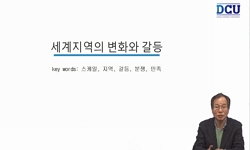This study analyses the local residents' conflicts in the regions such as Andong-Youngchon where the underwater canal construction have been taken first as a long-term construction in this country. Since south Korea was classified as one of the water-...
http://chineseinput.net/에서 pinyin(병음)방식으로 중국어를 변환할 수 있습니다.
변환된 중국어를 복사하여 사용하시면 됩니다.
- 中文 을 입력하시려면 zhongwen을 입력하시고 space를누르시면됩니다.
- 北京 을 입력하시려면 beijing을 입력하시고 space를 누르시면 됩니다.
水資源 政策을 둘러싼 地域住民들의 葛藤 分析 : 안동∼영천간 도수로 터널공사를 중심으로 = (An) analysis of local residents' conflicts on the water resources policy - focused on water canal construction in the regions : Andong city - Youngchon city
한글로보기https://www.riss.kr/link?id=T9454372
- 저자
-
발행사항
안동 : 安東大學校 行政經營大學院, 2002
-
학위논문사항
학위논문(석사) -- 안동대학교 행정경영대학원 , 지역정책학과 , 2002. 8
-
발행연도
2002
-
작성언어
한국어
- 주제어
-
KDC
359.08 판사항(4)
-
발행국(도시)
경상북도
-
형태사항
91p. : 삽도 ; 26cm.
-
일반주기명
참고문헌: p. 82-85
- 소장기관
-
0
상세조회 -
0
다운로드
부가정보
다국어 초록 (Multilingual Abstract)
This study analyses the local residents' conflicts in the regions such as Andong-Youngchon where the underwater canal construction have been taken first as a long-term construction in this country. Since south Korea was classified as one of the water-stressed nations, many experts and some environmental interest groups have alerted people about the importance of acquiring and using water resources wisely. However the aquisition and management of water resources hardly meets the need. It is vital that executive organization be equipped with the effective management of water resources. This is believed to have the supply and demand of water resources balanced by intergrating the five major rivers and transferring water routes from city to city, preventing damages from cold-weather and floods.
On the other hand, this prematurely launched construction aroused many problems such as major civil complains, the increase of construction expenses, the extention of construction period. This is presumed that this project was not fully prepared on the basis of research findings, data and appropriate assessment of the environment.
Consequently this study is to analyze the conflicts of Cheong-song county residents as a case, who had suffered from some conflicts at one of the construction sites and to suggest solutions for better policy of water resources.
This closely examines how the project has progressed from its initiation in 1988 throughout the end of 2001. Successful water canal construction depends on how the target groups response toward the construction. The findings are as followings :
First, these projects are hardly based on the expertise and research findings on the underwater canal construction, which subsequently led to some technical and planning errors.
Second, local residents have easier access to express and reflect their opinion and grievances to executive organization than ever in organized, specialized ways. These activities have been encouraged and nurtured mainly by environmental groups since south Koreans have gone through democratic system throughout the nations.
Presumably this kind of project will face other similar conflicting situations in the future unless some troubling factors are removed. For this reason, this study suggests some solutions on the local residents' complains.
First, it is essential that people around the construction sites need to positively view and understand the construction. They absolutely need to take water as a resource which is not only limited and shared with others, but also the interest and maintenance expenses should be shared.
Second, it is necessary to establish the appropriate systems. For example, executive organization need to develope the total management system to maintain the consistent policy and quality control of water. Furthermore it also needs to estimate the amount of water on demand in a reliable way and is capable to provide to who need it.
Third, it needs to closely examine how much the project costs to transfer water from cities to cities. It also needs to secure the planning and techniques throughout the project.
Finally, the executives should be furnished with the rational attitude to implement national projects like this. To put this into practice, it is suggested that the organization needs to hold the public hearings and the assessment of environment and to acquire the consistent and clear policy, the expertise, reliability, and integrity.
In conclusion, the water policy still have some positive sides while this country faces many obstacles mentioned above. Compared to other countries, the amount of domestic precipitation is relatively high. The problem is that more water leaks out to the sea than it is actually used at the factory and home, etc. Obviously it is not true this country is short of the absolute amount of water. Consequently it is imperative to suggest short-and long term tasks which make all the people in this country recognize water as a common property, having executive organizations equipped with the right attitude, policy, and practices .
목차 (Table of Contents)
- 목차
- 제1장 서론 = 1
- 제1절 연구의 목적 = 3
- 제2절 연구의 범위와 방법 = 3
- 1.연구의 범위 = 3
- 목차
- 제1장 서론 = 1
- 제1절 연구의 목적 = 3
- 제2절 연구의 범위와 방법 = 3
- 1.연구의 범위 = 3
- 2.연구의 방법 = 3
- 제2장 수자원 정책과 주민갈등에 관한 논거 = 5
- 제1절 우리 나라 수자원 정책 = 5
- 1.수자원 정책의 개념 = 5
- 2.수자원 정책의 연혁 = 9
- 3.우리 나라 수자원 특성 및 현황 = 12
- 1)수자원의 특성 = 12
- 2)수자원의 현황 = 14
- 4.수자원 유역간의 물 이동 = 16
- 제2절 수자원 정책에 대한 주민갈등 = 20
- 1.갈등의 의의 = 20
- 2.갈등의 이론적 전개 = 22
- 3.수자원 이용정책과 주민갈등 = 23
- 1)수리권에 관한 갈등 = 25
- 2)댐 주변 지역 주민들의 갈등 = 27
- 3)지하 도수로터널에 의한 지하수 고갈의 갈등 = 28
- 4)수계별 수자원에 관한 갈등 = 30
- 제3장 사례분석: 안동~영천간 도수로터널 공사 = 32
- 제1절 분석 틀의 설정 = 32
- 제2절 조사설계 = 35
- 1.설문작성 = 35
- 2.조사대상 선정 및 자료 수집 = 36
- 제3절 분석결과 = 38
- 1.표본의 특성 = 38
- 2.설문 측정 결과 = 41
- 3.정책내용의 불만원인 = 44
- 4.집행과정의 불만원인 = 50
- 5.도수로 공사 갈등 양상 = 59
- 제4장 갈등 해결 방안 = 71
- 제1절 정책내용 관련 방안 = 71
- 1.정책의 실현 가능성 제고 = 71
- 2.보상의 합리화 = 74
- 제2절 집행과정 관련 방안 = 74
- 1.집행기관의 협상 문화 정착 = 74
- 2.주민참여의 활성화 = 76
- 제5장 결론 = 77
- 참고문헌 = 82
- Abstract = 86
- 설문지 = 89












